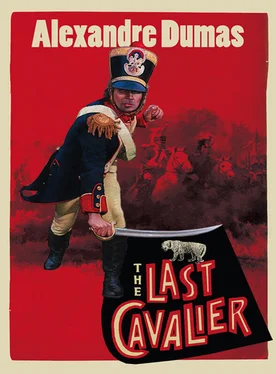“First of all, untie those two poor people.”
The bandits quickly did Cadoudal’s bidding. Madame Doley collapsed in an armchair, then drew her two children into her arms and pulled them to her breast. Her husband rose to his feet, walked over to Cadoudal, and shook his hand.
“And now?” asked the second in command.
“Now,” said Cadoudal, “I’ve been told that there are three brigades like yours.”
“Yes, General.”
“Who had the audacity to gather you together to do this odious work?”
“A man came from Paris; he told us that you would be back to join us within a month; he said that we should gather in your name.”
“Fighting against the government as Chouans I could understand. But burning, never! Am I an arsonist?”
“We were even told to choose the man among us who most resembled you, so that people would believe you were already here. We called him George II. What must we do now to atone for our mistake?”
“Your mistake was to believe that I could ever become the leader of a band of brigands like you, and there is no way to atone for that. Carry my orders to the other groups: They must disband and cease their odious activities immediately. Then send word to all the former leaders, and especially to Sol de Grisolles and Guillemot, asking them to take up arms and prepare once again to embark on a campaign under my command. However, they must not make a move or raise their white flag until I say so.”
The bandits withdrew without a word.
The farmer and his wife restored order to their wardrobes. The linen once more took its place on the shelves and the silverware in the drawers. A half hour later, the room looked as if nothing out of the ordinary had happened there at all.
Madame Doley had not been mistaken. Her husband had indeed taken precautions. He had hidden some of the silverware as well as the sack of gold, which contained probably twelve thousand francs. The Breton peasant, among all peasants, is the most defiant and perhaps the most provident. In spite of Cadoudal’s promise, Doley had worried that things might turn out badly, and in that case, he wanted to protect at least some of his fortune. And so he had done.
After seeing to Jean and his wife and then carrying out George II’s body, Monsieur and Madame Doley relocked their doors. Cadoudal, who had eaten nothing since morning, now sat at a simple supper, as if his day had passed without event. Refusing the bed the farmer offered, he stretched out on fresh straw in the barn.
The next day, scarcely had he arisen when Sol de Grisolles arrived. Living in Auray, about two and a half leagues from Plescop, he had been roused by one of the brigands who’d hoped to please Cadoudal by telling Grisolles without delay that Cadoudal was nearby. The news greatly astonished Grisolles, for he believed, like everyone else, that Cadoudal was in London.
Cadoudal told him the whole story and showed him the traces of fire and blood on the kitchen’s tile floor. These burning brigades had surely been a police plot, devised to nullify the treaty that Cadoudal had signed with Bonaparte by accusing the Breton general of breaking it. So Cadoudal concluded; and in light of that, he said, he was once more free to act as he wished: which was what he wanted to talk to Sol de Grisolles about.
His first intention was to inform Bonaparte that by virtue of what had recently happened in Brittany, he was withdrawing his word. Still, with proof incontrovertible that he had nothing to do with the new wave of banditry in the west—for indeed he had stopped it at his own life’s peril—he would not declare a war between sovereign powers, since that would be impossible for him to carry out; rather, he would undertake vengeance Corsican style. He wished to charge Sol de Grisolles with communicating the vendetta. It was a charge that Grisolles accepted immediately, for he was a man who never backed away from what he believed to be his duty.
Grisolles would then join Laurent, wherever Laurent happened to be, and have him put his Companions of Jehu back into operation at once, with the understanding that Cadoudal himself would lose no time in going first to London and then returning to Paris to set his own plans into execution.
Once he had given his instructions to Sol de Grisolles, Cadoudal said good-bye to his hosts, begged their forgiveness for having used their home as the theater for the horrors the day before, and mounted his horse. While Grisolles was heading to Vannes, Cadoudal was galloping to the beaches at Erdeven and Carnac, where his boat, only apparently a fishing boat, was plying along the coast.
Three days later, Sol de Grisolles was in Paris, requesting from the First Consul a safe-conduct and a meeting for a matter of the greatest importance. The First Consul sent Duroc to his hotel, but Grisolles, apologizing politely like a true gentleman, declared that he could repeat only to General Bonaparte the message he carried from General Cadoudal. Duroc reported back to the First Consul and then returned to escort Grisolles to the Tuileries.
Bonaparte, it turned out, was quite upset about the Cadoudal matter. “So,” he said without allowing Sol de Grisolles time to speak, “that is how your general keeps his word. He agrees to leave for London, and instead he stays in the Morbihan where he raises bands of burning brigades who rampage all over, as if he were Mandrin or Poulailler. But I have given orders. All the authorities have been alerted. If he is taken, he will be shot like a bandit without a trial. Don’t tell me it’s not true. Le Journal de Paris has published an article, and my police reports agree. Besides, people have recognized him.”
“Will the First Consul permit me to answer,” said Sol de Grisolles, “and to prove my friend’s innocence with a few words?” Bonaparte shrugged.
“And if in five minutes you admit that your newspapers and your police reports are wrong and I am in the right, what will you say?”
“I will say… I will say that Régnier is an idiot, that is all.”
“Well, General. A copy of Le Journal de Paris reporting that Cadoudal had never left France and was raising burning brigades in the Morbihan ended up in his hands in London. He immediately boarded a fishing boat and came back to France, landing on the Quiberon peninsula. He hid at a farm that was to be burned that very night, and he burst from his hiding place just as the leader of the brigade, who claimed himself to be Cadoudal, was about to torture the farmer. The farmer’s name is Jacques Doley; the farm is called Plescop. Cadoudal walked straight up to the man who had usurped his name and blew out his brains, saying: ‘You are lying. I am Cadoudal.’
“And then he asked me to tell you, General, that in fact it was you, or at least your police, who had tried to sully his name by placing at the head of the burning brigades a man of his size and stature, a man who looked enough like him to be mistaken for him. He took vengeance on the man by killing him right there on the spot. That done, he ran the others off the farm they had presumed to seize, although there were twenty of them and he was but one.”
“What you are telling me is impossible.”
“I saw the body, and here is a letter from two farmers attesting to it all.” Grisolles placed under the First Consul’s eyes the written account of the night’s events. It was signed by Jacques Doley and his wife.
“So,” Grisolles continued, “Cadoudal now frees you from your promise and takes back his own. He is unable to declare war since you have stripped him of all his means of defense, but he declares upon you a Corsican vendetta. For you he adopts the code of your own country: Defend yourself! He will defend himself!”
Читать дальше












